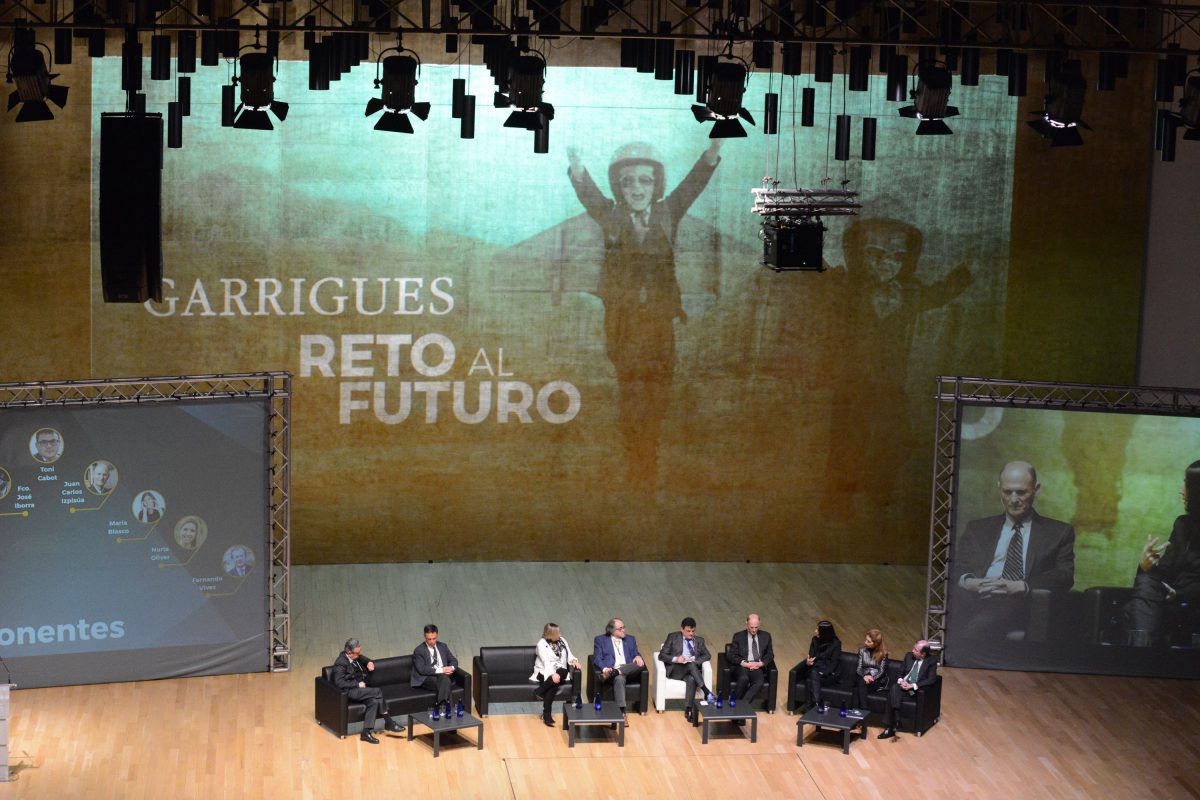
The challenge to the future of aging
The challenge to the future is approached by experts in Alicante, for Spain to maintain its research leadership amongst this area. The researchers propose the possibility of having a pioneer institute, investigating this topic within the province of Alicante.
The group of experts meeting today in Alicante to discuss the challenges linked to population aging, showed that one of the great challenges in research is precisely to understand the process of biological aging in order to prevent or treat diseases more efficiently. Spanish scientists, who work inside and outside of Spain, and experts in other fields have agreed on the importance of maintaining Spain’s leadership in this type of research. Likewise, the possibility of opening a new research institute pioneer in aging investigation in alicante was raised.
The international forum “Challenge to the future”, organized by the Garrigues firm together with important institutions and local and regional entities, has shown how important it is for us to understand why we age, since this is the origin of many of the pathologies that today represent the main causes of mortality in our society. The forum has also addressed the challenges of an increasingly aging population from the point of view of technology, economics and law.

From left to right ,Andrés Pedreño, Amalio Telenti, Ángela Nieto, Fco. José Iborra, Toni Cabot (moderador), Juan Carlos Izpisúa, María Blasco, Nuria Oliver and Fernando Vives.
The “Challenge to the Future” summit was inaugurated by the President of the Valencian Generalitat, Ximo Puig, the Mayor of Alicante, Gabriel Echávarri and the President of the Diputación de Alicante, César Sánchez, together with Fernando Vives, CEO of Garrigues. More than a thousand people gathered in the ADDA, and were all able to witness an exciting debate on topics such as a future without disease, genes sequencing and their decline, the activation of embryonic genes, healthy aging, technology to live more and better, the economic framework and the right (or not) to live longer.
These have been some of the conclusions of the speakers:
Ángela Nieto, a research professor at the Neurosciences Institute of Alicante (mixed center of the CSIC and the Miguel Hernández University) has shown “that, although it seems paradoxical, there is a reactivation of embryonic genes in diseases whose incidence increases with aging, such as cancer or organ degeneration ». In addition to underlining the importance of this knowledge for the design of therapies, Nieto has affirmed that the Alicante region, as a destination and a privileged area for the elderly population, could become a node not only for discussion, but also for the generation of knowledge for developed countries that already consider health and well-being as a challenge of priority.
In this sense, Andrés Pedreño, professor in applied economics and former Head of the University of Alicante, has underlined the possibilities offered by the digital economy to tackle aging as an opportunity: “We need approximations which don’t identify social and demographic vulnerability, but the solutions, even the opportunities that arise if the problem is approached from the correct perspective. The digital economy can become an asset ».
Challenge to the future: Investigations
About the investigations that are being developed, María A. Blasco, head of the National Center for Oncological Research and an expert in molecular mechanisms of aging, has stated that “only by knowing the origin or cause of diseases have we been able to control them, an example of this has been infectious diseases; In the same way, only if we understand what causes aging at the molecular level will we be able to prevent and cure diseases such as cardiac arrest, neurodegenerative diseases, etc. ». She also expressed that, although in our country international leaders work in areas such as molecular research, there is no center that tackles aging globally: “Spain has the opportunity to take the global lead”.
Juan Carlos Izpisúa Belmonte, a professor at the California Institute Salk, a world leader in biology, explained that research laboratories are optimistic about the challenge of offering a healthy aging: “Optimism not to reach the chimera of immortality, but to make the dream of a healthier aging come true. For this purpose, the work of a few scientists is not enough. The support of the whole society is necessary, but, especially, of those who have real power to decide and act upon this ».
For his part, Amalio Telenti, chief scientist at the Scripps Translational Science Institute, also located in La Jolla, referred to the importance of defining the research objective: extend the life of the species, the individual or the commitment to health maintenance? “The genes involved are not necessarily the same, and therefore, the therapies (drugs or genetic modification) will be different according to the objective: to prolong the life of the human species more than 120 years, to ensure that all humans live to the possibility of the species (between 80 and 100 years) or get to live healthily. It is highly unlikely that there is a “gene of immortality” that can be manipulated for all those purposes. “
Healthy aging, is it possible?
Francisco José Iborra, head of the Department of Molecular and Cellular Biology of the National Center for Biotechnology (CSIC), said that “from a biomedical point of view, living longer does not only mean living longer, but we must guarantee that we reach an old age in the best possible conditions. This can only be achieved by increasing our knowledge about aging processes, identifying the routes and targets on which to intervene. This will allow us to ensure a healthy aging ».
Along with the role of biology or medicine, disciplines such as law and technology must also respond to the challenge of an increasingly aging population. Fernando Vives, president of the Garrigues firm, reflected on whether we have the right to live longer: “We are facing a disruptive scientific process that will lead to an aging population, a change in individuals life cycles and a new way of life. This right has to be there, it has to guarantee general access to science and technology; protect and favor scientific work and help structure our lives, which will be very different from what we are used to. Only in this way will we really have the right to live for longer».
The technological point of view was discussed by Nuria Oliver, head of Research in Data Sciences at Vodafone and expert in artificial intelligence: “Technology will undoubtedly be key to helping us face the global challenge of aging, significantly improving our quality of lifetime”. In her presentation she explained how technology will help human beings to face not only the disease, but also complex problems such as loneliness: sensors and intelligence in our homes to understand our patterns of activity; tools to detect and manage chronic diseases; immersive communication systems to be connected with our loved ones; emotionally and socially intelligent robots; and technology that allows us to continue to be active participants in society. “The wisdom acquired through experience is a very valuable asset for society which we can not miss,” said the speaker.
About Challenging the Future
Garrigues organized this event in collaboration with, Diario Información, Generalitat Valenciana, APD, Universitas Miguel Hernández, Colegio Oficial de Médicos de Alicante, Colegio Oficial de Farmaceúticos de la Provincia de Alicante, Colegio de Economistas de Alicante, Ayuntamiento de Alicante, Foro de Debate Económico, Germán Bernácer, Ilustre Colegio Provincial de Abogados de Alicante, Diputación de Alicante, Cámara de Comercio de Alicante, Asociación de la Empresa Familiar, Provincia de Alicante, Ineca (Instituto de Estudios Económicos de la Provincia de Alicante).
The day ended with a discussion panel, moderated by the director of the Information Journal, Toni Cabot, in which all the speakers participated.




